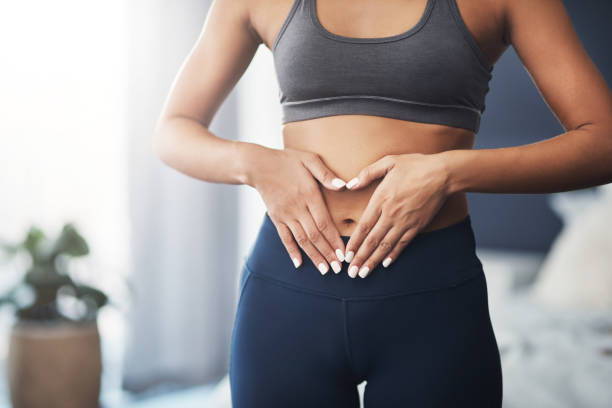how to beat bloat, according to a nutritionist
by team nuut

You know the symptoms immediately: rumbly tummy, snug waistband and general feeling of blah. Feeling bloated can seriously break your day, not just because your clothes suddenly feel suffocating but because it makes you feel so desperately uncomfortable.
We chatted to nutritionist Kirsty Jenkins from Pure Health Nutrition to find out what causes bloating and how to stave it off. Take notes and you'll be fitting in your skinny jeans in no time.
Why do I feel bloated after eating?
It can be caused by lots of things. The mechanical reasons include poor chewing or too much water consumption whilst eating, and the biological include poor gut health, stress, or intolerance of different foods. If you have a gut condition like SIBO, IBS, H.Pylori or gut dysbiosis, then certain foods will make you feel bloated, however food isn’t the sole cause. Bloating can be blamed more on disrupted gut health. If you have an allergy or intolerance to a particular food, then the bloating is caused from the reaction it causes, not the actual food.
What about foods containing high sodium?
Sodium is a key mineral involved in electrolyte balance within the body, so high sodium foods can cause the body to hold onto fluid which results in bloating.
Do hormonal fluctuations and menopause cause bloating?
Hormonal imbalances negatively impact the gut microbiome which can cause poor gut health and as a result, bloating. Oestrogen can also increase fluid retention which can show as bloating in some women. If you are in menopause, bloating can occur due to hormonal fluctuations which can cause fluid retention and disrupt the gut microbiome.
Does drinking water help? It just makes us feel more bloated!
If you are dehydrated, it means you have an electrolyte imbalance and your body is holding onto water which looks like bloating. So in this case, drinking water helps rebalance the electrolytes and reduces fluid retention. But if you are experiencing bloating due to an underlying cause, like poor gut health or food reaction, than drinking water won’t help.
Does working out help?
Yes exercise is great! It helps reduce bloating thanks to an increase of blood flow to the gastrointestinal tract which supports the passage of gas and contents along the gut.
How can good quality sleep help a bloated stomach?
If your bloating is related to stress, good quality sleep puts the body in a parasympathetic nervous system state that promotes blood flow and digestion. So good-bye bloating!
What are some daily changes that can help prevent bloating?
Take care of your gut health! Ensure you are adequately hydrated, moving daily, and eating mindfully. Cut back on refined sugars and artificial sweeteners and never eat on the run. Sit down and take your time to eat, chewing each bite for at least 20 times. And of course, have a nuut that provides your body with a powerful dose of micronutrients in one go. I love putting nuut in my morning smoothies. Especially those days I am pushed for time. It keeps me energised and feeling full for hours on end.